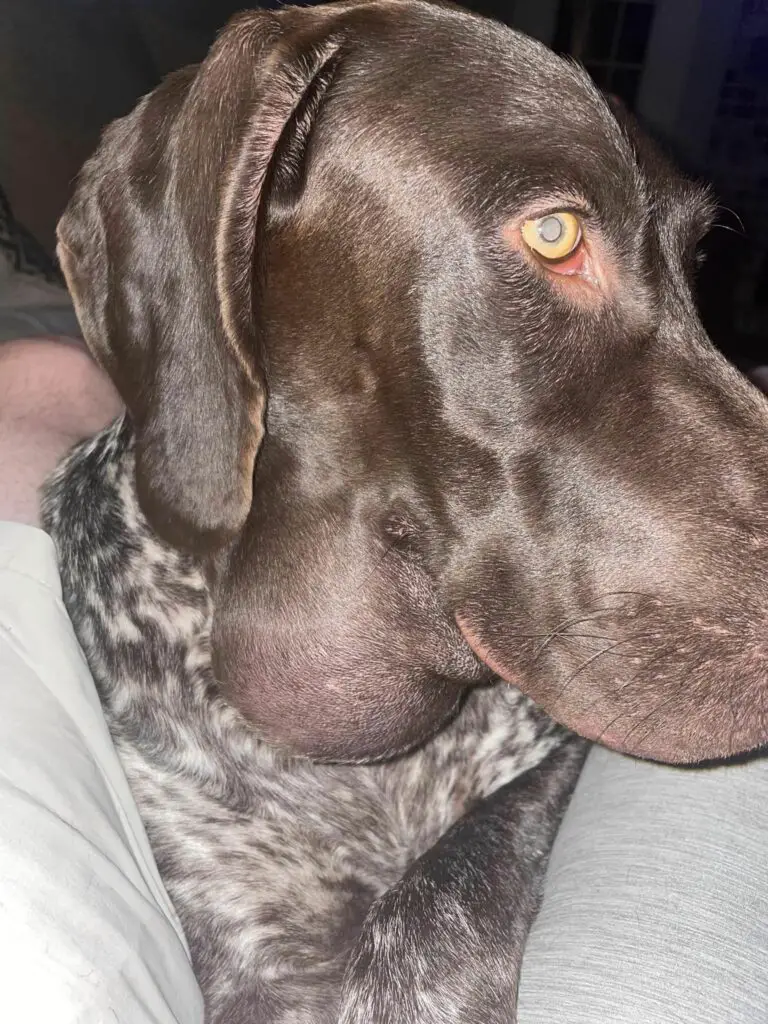In the world of pet health, understanding the symptoms and causes of common conditions can be a lifesaver.
One such condition that often raises concern among dog owners is swollen lymph nodes.
These small glands play an integral role in your furry friend’s health, making it essential to understand what could cause them to become enlarged.
In this blog post, we delve into the nine most common causes of swollen lymph nodes in dogs.
From infections to allergies and even cancer, we will shed light on these potential triggers, helping you keep your pet healthy and happy.
Key Takeaway
- Lymph nodes in dogs are small, bean-shaped glands that function as part of the immune system, helping to filter harmful substances and produce white blood cells to fight off infections and diseases.
- Swollen lymph nodes in dogs can be caused by infections, cancer, inflammation, allergies, and local diseases.
What Are Lymph Nodes in Dogs
Lymph nodes in dogs are small glands that play a crucial role in the immune system.
They are found in many different places in the body and are part of the lymphatic system, which helps to transport infection-fighting cells throughout the body.
These nodes house many lymphocytes, which process antigens for antibody production.
See also: Can Dog Lymph Nodes Be Removed?
9 Causes Of Swollen Lymph Nodes In Dogs

- Bacterial infection
- Viral and fungal infection
- Parasitic infections
- Puppy strangles
- Lymphoma (type of cancer)
- Local diseases
- Allergic reactions
- Autoimmune diseases
- Trauma
Bacterial Infection
Bacterial infections can cause the lymph nodes in dogs to swell. These infections may originate in the body or directly within the lymph node itself. When the body fights off an infection, the lymph nodes produce more white blood cells, causing them to enlarge.
Viral Infection
Like bacterial infections, viral infections can also lead to swollen lymph nodes in dogs. Common viral infections in dogs include canine distemper, parvovirus, and rabies. As the body’s immune system responds to the virus, the lymph nodes may increase in size.
Fungal Infection
Fungal infections are another potential cause of lymphadenopathy in dogs. In fact, fungal organisms such as Blastomyces, Histoplasma, and Coccidioides are known to cause systemic infections in dogs, which can lead to inflammation and enlargement of the lymph nodes.
Parasitic Infections
Parasitic diseases, such as heartworm, tick-borne diseases, and mange, can cause swollen lymph nodes in dogs. These parasites can trigger an immune response that leads to lymph node enlargement.
Puppy strangles
Puppy strangles, also known as juvenile cellulitis, is a condition in dogs that causes sudden facial swelling, particularly around the muzzle and eyelids.
This is swiftly followed by an enlargement of the lymph nodes in the neck. The submandibular lymph nodes, located on either side of the neck under the jaw, often become swollen and tender.
This is because the body’s immune system is reacting to the condition, leading to inflammation and swelling of the lymph nodes. In severe cases, these lymph nodes may even abscess, further enhancing the swelling.
Lymphoma (Type of Cancer)
Lymphoma, a type of cancer affecting the lymphatic system, is one of the most common reasons for enlarged lymph nodes in dogs. This cancer causes the lymph nodes to rapidly increase in size and can affect multiple nodes throughout the body.
Respiratory Infections
Respiratory infections can cause specific lymph nodes, like those in the neck or chest, to enlarge. As the body fights the infection, these lymph nodes may become inflamed and noticeable.
Dental Disease
Dental diseases, such as periodontal disease and oral infections, can lead to swollen lymph nodes, particularly those near the jaw. The lymph nodes respond to the infection by producing more white blood cells and enlarging.
Allergic Reactions
Allergic reactions in dogs, whether to food, environmental factors, or substances they come into contact with, can also result in swollen lymph nodes. The body’s immune response to the allergen can cause the lymph nodes to enlarge.
See also: Can Dogs Live Without Lymph Nodes?
How Swollen Lymph Nodes Are Diagnosed in Dogs

Diagnosing swollen lymph nodes in dogs typically involves a number of steps:
- Physical Examination: The vet may start by conducting a thorough physical examination of the dog to identify any swollen lymph nodes and assess their size, shape, and consistency.
- Medical History: A detailed medical history may be taken to understand the dog’s overall health and any previous medical conditions or treatments.
- Blood Tests: Blood tests can provide information about the dog’s overall health and can help rule out infections and other diseases.
- Fine Needle Aspiration (FNA): This is a common diagnostic procedure where a thin needle is used to collect cells from the swollen lymph node. These cells are then examined under a microscope to look for signs of disease.
- Biopsy: In some cases, a biopsy may be done, which involves removing a small piece of tissue from the lymph node for further microscopic examination.
- Imaging Tests: Imaging tests such as X-rays, ultrasounds, or CT scans may be used to get a better view of the lymph nodes and surrounding structures.
- Culture and Sensitivity Testing: If infection is suspected, a culture and sensitivity test may be performed. This involves growing bacteria or fungi from the lymph node to identify the specific type of infection and determine the most effective treatment.
See also: How Big Are Dog Lymph Nodes?
How To Help a Dog With Swollen Lymph Nodes
Here is how to help a dog with swollen lymph nodes:
Regular Exercise and Balanced Diet
Regular physical activity and a balanced diet can help boost a dog’s immune system, which in turn may help prevent illnesses that could cause swollen lymph nodes.
Veterinary Treatment
Treatment of swollen lymph nodes largely depends on the underlying cause. If the swelling is due to a bacterial or fungal infection, your vet may prescribe antibiotics or antifungal medication.
In cases of lymphoma, chemotherapy is usually the chosen course of treatment.
Medications and Comfort Measures
In some instances, vets may prescribe anti-inflammatory pain medications, medications for an upset stomach, or sedatives to help dogs feel more comfortable.
Antihistamines and steroids may also be used to treat allergic reactions, while corticosteroids may be prescribed for autoimmune diseases.
No Home Remedies
It’s important to note that there are no proven home remedies for dogs with swollen lymph nodes. The best thing you can do as a pet owner is to consult a vet promptly for a proper diagnosis and treatment plan.
Understand the Cause
Understanding the cause of swollen lymph nodes can help guide treatment. For instance, local respiratory infections or dental diseases can cause specific lymph nodes, like the submandibular lymph nodes, to enlarge.
See also: How To Check a Dog’s Lymph Nodes
FAQs
Can infections be a potential reason for swollen lymph nodes in dogs?
Yes, infections can be a significant reason for swollen lymph nodes in dogs. These infections can be bacterial, viral, fungal, or parasitic.
In many cases, the enlargement of the lymph nodes is a sign that the immune system is working harder to fight off the infection, leading to an increase in white blood cells.
Are there any specific diseases or viruses that can lead to lymph node swelling in dogs?
Yes, several diseases or viruses can lead to lymph node swelling in dogs. Some of these include tick-borne diseases like Lyme disease, ehrlichiosis, and parasitic infections like demodectic mange. Viral infections such as parvovirus can also cause the lymph nodes to swell.
How do allergic reactions contribute to swollen lymph nodes in dogs?
Allergic reactions in dogs can stimulate the immune system, leading to inflammation and swelling of the lymph nodes.
This is because the lymphatic system is responding to the allergens as if they were harmful substances, leading to an immune response. Common allergens can include certain foods, and environmental factors like pollen, or flea saliva.
Can certain types of cancer result in enlarged lymph nodes in dogs?
Yes, certain types of cancer can result in enlarged lymph nodes in dogs. Lymphoma, which is a cancer of the lymphocytes (a type of white blood cell), is one of the most common cancers to affect the lymph nodes in dogs.
Are there any environmental factors that may trigger swollen lymph nodes in dogs?
Environmental factors, such as exposure to certain parasites or allergens, can trigger swollen lymph nodes in dogs. For example, a dog might develop swollen lymph nodes after being bitten by a tick carrying Lyme disease, or after having an allergic reaction to something in its environment like pollen or dust mites.
What role does the immune system play in causing lymph node enlargement in dogs?
The immune system plays a significant role in causing lymph node enlargement in dogs. Lymph nodes are part of the immune system and contain white blood cells called lymphocytes that help fight off infections and diseases.
When a dog has an infection or other disease, the lymph nodes may produce more of these cells and become enlarged as a response to the illness.
Are there any breed-specific predispositions to swollen lymph nodes in dogs?
Golden Retrievers and Boxers are among the breeds more prone to lymphoma, which can cause lymph node enlargement. Always consult with your veterinarian for breed-specific health concerns and preventive care.
In Conclusion
In conclusion, swollen lymph nodes in dogs can result from various causes ranging from infections, autoimmune diseases, dental issues to cancer.
Bacterial, fungal, tick-borne and parasitic infections are among the common infectious causes of lymph node enlargement in dogs.
Autoimmune diseases like lupus, immune-mediated hemolytic anemia (IMHA), and polyarthritis can also lead to this condition.





Leave a Reply